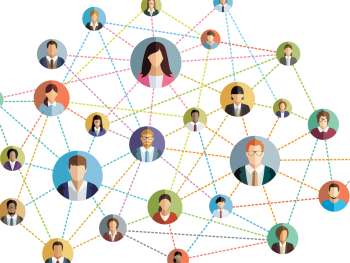More than ever, individual performance requires working with and through others. Organizations push employees to collaborate more—and faster. But without understanding how to collaborate effectively, collaboration itself is hurting employee performance and well-being.
For decades, I have studied the networks and collaborative practices of high performers. I have mapped how the drive for collaboration is putting pressure on individuals, teams and organizations. And, frankly, it doesn’t look good.
Collaborative Work has Risen By 50% in the Past Ten Years
For many of us, 85% of the work day is consumed with meetings, email, calls and other collaborative work. When new challenges or projects emerge, the number of people we need to connect with or collaborate with expands even more.
Yet, few of us—as individuals and as teams and organizations—are strategic about collaboration. There are no Chief Collaboration Officers. We track every expense to the penny but are wasting enormous amounts of time and energy working inefficiently with some people and not at all with others.
As a result, people are suffering from collaborative overload. And this deluge of collaborative overload stifles performance, crushes our vitality and well-being, prevents us from being innovative and derails careers.
The Problem Is Us
When I started to dig into the problems of collaboration, I was sure the blame would be clearly placed on always-on work cultures, encroaching technology, demanding bosses, difficult clients and inefficient coworkers. Those challenges are real, but I am now convinced that at least half of the blame falls back on us.
A couple years ago, I interviewed 160 high performers. Many of them described either a sudden surge or the slow burn of collaborative overload. Some stood out because they took action to put their lives back in balance.
About 45 minutes into the interviews, their voices became much more intense and they confessed something like: “You know Rob, I hit a point in my life where I wasn’t healthy. I had fewer and fewer friends and activities I enjoyed. And I was more distant from people I cared about than I wanted.” They agonized over their situation for months before finally deciding, “I have to reclaim my life!”
They braced themselves for the negative consequences of making even the smallest change. And they were stunned that absolutely no one noticed when they took action! Something that had great value to them, such as leaving work on time, avoiding emails after 9PM or declining meetings, caused none of the problems they anticipated.
Our Beliefs Are Generating Overload
Most of us are following unspoken rules about collaboration, thinking they are enforced by someone or something “out there.” But usually that isn’t true. The behavior police are inside of us in the form of the beliefs we hold and the resulting burdens we place on ourselves.
These beliefs are deeply held, and often unexamined, desires, needs, expectations and fears centered around how we feel we need to “show up” for others each day. Many of these feelings are tied up with identity and personas that we develop at work.
One manager might have a powerful desire to help others. A different manager might feel a powerful need for accomplishment. Another might have a need for status. Still another might have a desire for rewards such as recognition, promotion or money. And someone else might be motivated by fear of failure, criticism or exclusion. The list goes on.
Any of these motivators can create collaborative overload by pushing us to engage in ways that are not directly tied to what should always be our goal: improving our effectiveness, organizational impact and well-being.
Beliefs can be extremely hard to counter or shift, but the people who have figured it out provide clues to the rest of us, including:
- Set rules and boundaries to counter your tendencies. For example, if you wrestle with seeking status or recognition, try to engage only where you are truly the only one able to do the work. Or, if your desire to help has you jumping into a project or debate without being asked, learn to slow your response.
- Remind yourself that saying “yes” means saying “no” to something else. Every time you agree to a collaboration, you are giving up time that could be used for something that’s more important to you in the long run—a professional objective, a personal priority, your own health.
- Consider other options. You don’t always have to make an either-or choice, under the pressure to say yes or no. Sometimes you can cite the other demands on your time as reasons why you can’t simply say yes to the request or assignment; then you might be able to discuss alternatives, such as signing onto the project in a limited advisory capacity.
A first step in reducing overload is becoming aware of your internal triggers—and fight the enemy within.What are the beliefs that are driving your decisions about how to collaborate and work with your colleagues? Learn how to overcome those barriers and gain tips for changing structures and behaviors that add to collaborative overload by reading Collaboration Without Burnout in the Harvard Business Review. Or put the ideas into practice for yourself using our Collaborative Overload Tools.
Share!




 6 Types of Collaborative Disfunction—and How Teams Can Do Better
6 Types of Collaborative Disfunction—and How Teams Can Do Better
 Rob Cross has studied the underlying network dynamics of effective organizations and the collaborative practices of high performers for more than 20 years. Through research and writing, speaking and consulting, and courses and tools, Rob’s network strategies are transforming the way people lead, work and live in a hyper-connected world.
Rob Cross has studied the underlying network dynamics of effective organizations and the collaborative practices of high performers for more than 20 years. Through research and writing, speaking and consulting, and courses and tools, Rob’s network strategies are transforming the way people lead, work and live in a hyper-connected world.